Scientists at the John Innes Centre are recognised for their contributions to the research community, both nationally and internationally
Prestigious Wolf Prize honour for Professor Dame Caroline Dean
Professor Dean received the Wolf Prize in Agriculture for her ground-breaking work on flowering time regulation and the epigenetic basis of vernalization.
The award means she joins some of the world’s most eminent scientists in receiving honours from the Wolf Foundation.
The Wolf Prize in agriculture is one of six prizes established by the Israel-based Wolf Foundation which are awarded annually to prominent scientists and artists for their unique contribution to humanity.
Wolf Prize laureates include astrophysicist Professor Steven Hawking, artist Marc Chagall, conductor and opera singer Jessye Norman.
The 2020 announcement included the joint award for Medicine to Professor Jennifer Doudna (University of California, Berkeley) and Professor Emanualle Charpentier (Max Planck, France) who together led the discovery of the revolutionary gene-editing tool CRISPR.
She comments, “It is truly an honour and privilege to receive this award alongside such distinguished figures from the world of science and the arts. I’m grateful to collaborators and colleagues who have contributed to my scientific journey over many years”.
On that occasion Professor Dale Sanders, Director of the John Innes Centre said: “I am so pleased that the Wolf Foundation has seen fit to award this prize to Caroline for her pioneering work.
“Throughout her career Caroline has asked fundamental questions about how plants work. The questions are profound, and centre on the philosophy that if one can ask a basic question and then get to a biological mechanism, all sorts of interesting agricultural implications emerge – as they have clearly done”.
Professor Dean’s research over a 32-year-career at the John Innes Centre has focussed on two central questions in plant biology: Why do certain plants have to pass through winter before they bloom, and how do they remember that they have been exposed to cold temperatures? These fundamental questions have been the cornerstone for increasing the yield of agricultural crops in temperate climates.
Two researchers awarded BBSRC Discovery Fellowships
Dr Chris Morgan and Dr Claudio Greco have been awarded three-year BBSRC Discovery Fellowships to take forward their innovative work at the John Innes Centre.
These prestigious awards are made to early-career Postdoctoral Researchers who are transitioning towards independence and have demonstrated the potential to become future research leaders.
Dr Morgan’s fellowship research, hosted by the lab of Dr Xiaoqi Feng, aims to understand the impact of climate change on plant meiosis.
Dr Greco’s fellowship research, hosted by Professor Barrie Wilkinson and Professor Matt Hutchings, will investigate Escovopsis, a fungal pathogen of the nests of leafcutter ants, as a potential source of new antibiotics.
BBSRC fellowships are offered to up to 15 researchers each year with projects encouraged to fit BBSRC’s strategic priorities.
John Innes Centre research attracts global health charity funding
Two talented early-career scientists have won £2.5m funding from the global health charity Wellcome Trust, to carry forward their influential research at the John Innes Centre.
Dr Dmitry Ghilarov has won a £1.3m five-year Wellcome Trust Sir Henry Dale Fellowship, an award jointly funded by the Royal Society. It is the first time this prestigious award has been received by a John Innes Centre scientist.
Dr Tung Le has won a £1.2m Wellcome Trust five-year Investigator award which is designed to enable independent researchers addressing some of the most important questions in science.
Dr Tung Le’s research focuses on understanding bacterial chromosome structure and its impact on DNA replication and segregation
Dr Ghilarov, currently based at the Malopolska Centre of Biotechnology, Jagiellonian University, Krakow, Poland, won the fellowship for his research vision titled: ‘Ringing the changes; how bacterial enzymes convert ribosomally-synthesised peptides into antibiotics’.
He is due to take up the fellowship-funded post as a Group Leader in the John Innes Centre Department of Biological Chemistry in September 2021.
Professor Saskia Hogenhout honoured for paradigm-shifting research
Professor Sashia Hogenhout has been elected a fellow of the American Phytopathological Society (APS) in recognition of her pioneering career.
The honour is made to current APS members for distinguished contributions to plant pathology and their commitment to mentoring.
A Group Leader at the John Innes Centre, Professor Hogenhout focuses on understanding the mechanisms that drive interactions between plants and insects and the role of microbes in these interactions.
Professor Hogenhout has pioneered mechanistic molecular research on phytoplasmas – insect-transmitted bacterial parasites that inhabit the vascular tissues of plants.
The award recognises Professor Hogenhout’s commitment to teaching and training students and Postdoctoral Researchers.
It also recognises her leadership of collaborative multidisciplinary research projects, the most recent being the BBSRC-funded BRIGIT consortium to enhance surveillance and response to the threat of the plant disease Xylella fastidiosa.
Professor Cristobal Uauy wins Women in Triticum Mentor award
Professor Cristobal Uauy has been honoured for his role in mentoring early career women wheat researchers.
Professor Uauy, receives the 2021 Jeanie Borlaug Women in Triticum (WIT) Mentor Award. The prestigious awards, made by recognise scientists and scientific mentors working to protect global food security through innovative research in wheat and its nearest cereal relatives.
The WIT Mentor Award is made by the Borlaug Global Rust Initiative (BGRI) and recognises the efforts of men and women who have inspired and shaped the careers of women working in wheat.
“It’s a great honour to receive this award and a privilege to help the careers of outstanding women researchers as they make an impact on the world through their innovative research”, said Professor Uauy.
Since founding the WIT awards in 2010, the BGRI has recognised 60 early career award winners and 11 mentors from 25 different countries.
Professor Uauy’s research focuses on using genetics and genomics to improve both yield and quality components in wheat for farmers, industry and consumers.












